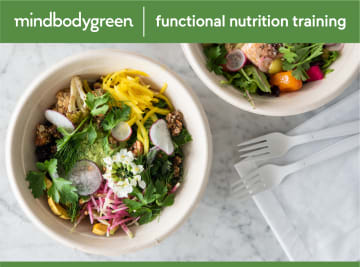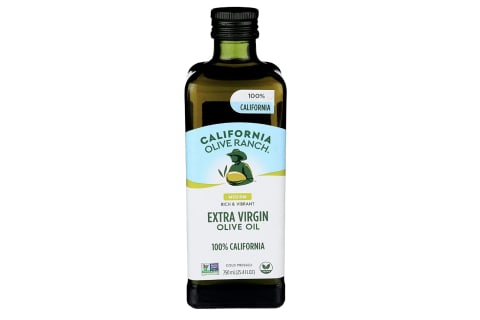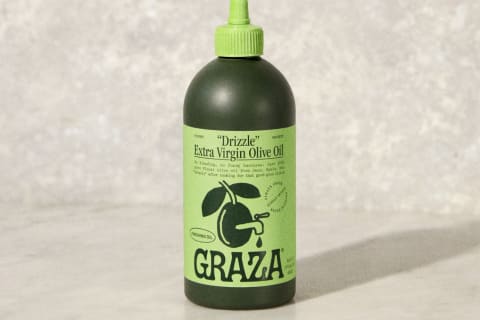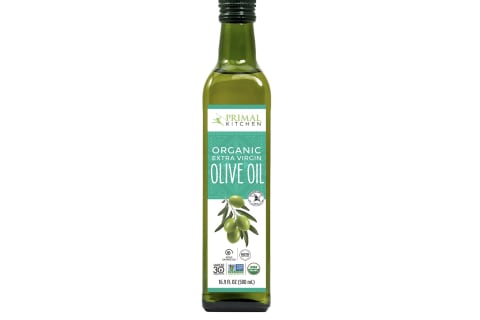Olive Oil vs. Extra-Virgin Olive Oil: What's The Difference & Which One Should You Choose?


The cooking oil aisle of the grocery store can be a downright overwhelming place. In the name of demystifying it, today we're breaking down the key differences between extra-virgin olive oil and pure olive oil. Along the way, we'll cover which one's healthier, when to use each, and how to make sure your olive oil is legit.
Advertisement
What is extra-virgin olive oil?
Extra-virgin olive oil (EVOO) is pretty much the cream of the crop when it comes to olive oils, due to its high nutritional value. Here's what to know.
How it's made:
Typically, EVOO is made without the heat or chemicals used to produce other cooking oils. Instead, EVOO is made by crushing up fresh olives into a mash and then either spinning or kneading the mixture to separate out the oil, explains dietitian Desiree Nielsen, R.D.
Many extra-virgin olive oils are labeled as "cold-pressed" to signify that they're produced at a low heat.
Advertisement
Health benefits:
In general, the healthiest oils are minimally processed—and EVOO fits the bill.
"Extra-virgin olive oil contains polyphenols, a class of naturally occurring phytochemicals, that are known to be antioxidant, anti-inflammatory, and possibly even prebiotic," explains Nielsen.
One of the most researched of these polyphenols is oleocanthal, which has been shown to have anti-inflammatory properties1. It's in good company, too; olive oil contains more than 30 different phenolic compounds2.
Important to note here: "The amount of polyphenols in any given oil is determined by many factors, such as growing conditions," Nielsen says. "Oils that are unfiltered retain the highest amount of these phytochemicals." Most EVOOs in your average supermarket are filtered and contain fewer polyphenols—though they're certainly still beneficial!
In addition to those powerful compounds, EVOO also contains vitamin E and vitamin K, adds integrative dietitian Jessica Cording, R.D.
Then there are the fats in EVOO. Whether extra-virgin or not, olive oil contains primarily heart-healthy monounsaturated fats3 (specifically oleic acid). In addition to helping decrease LDL (aka "bad") cholesterol and increase HDL ("good") cholesterol, these fats may have anti-inflammatory properties of their own.
EVOO's benefits don't end with heart health, either. A large randomized controlled trial4 on the Mediterranean diet found that women who supplemented this healthy eating pattern with EVOO had a significantly lower risk of breast cancer than women who stuck to low-fat eating, shares plant-based chef and registered dietitian Alex Caspero, R.D.
Research also suggests that EVOO may have protective benefits against Type 2 diabetes5, gut dysbiosis6, and cognitive decline7.
Advertisement
Taste:
Thanks to its minimal processing, EVOO is typically vibrant in color, ranging from gold to green. That punchy color is matched by punchy flavor that also varies based on the types of olives used, where they were grown, and what conditions they were grown in, explains Nielsen.
"The phytochemicals in extra-virgin olive oil contribute to the flavor, whether fruity, grassy, bitter, or even peppery," she says. "Peppery oil, which is high in oleocanthal8, can even make you cough a bit when it hits the back of your throat!"
Smoke point:
Many integrative health experts believe that EVOO, particularly cold-pressed, unfiltered EVOO, shouldn't be heated at all.
One reason for this is that "heat reduces the activity of some of the oil's phenolic compounds9," notes Cording. So, if you really want to preserve all of the goodness in that cloudy, virgin-as-can-be oil, use it for dressing and finishing—and that's it, Nielsen suggests.
That said, you can absolutely cook with EVOO. "You can roast, bake, and saute with it," says Cording. Just note that it has a smoke point of 350 degrees Fahrenheit, so it's not a great choice for higher-heat methods like frying.
Advertisement
Price:
Extra-virgin olive oil is the most expensive type of olive oil, with prices varying from bottle to bottle based on factors like where it's made, the growing process, and certifications like USDA Organic.
Summary
Advertisement
What is regular (pure) olive oil?
Ready to feel a little tricked? "Despite its name, pure olive oil is actually a more refined product than EVOO," explains Cording. Also referred to as "regular olive oil," it packs less of a punch than extra-virgin olive oil (in a few ways!) but is still a healthy staple to keep stashed in your pantry.
How its made:
Unlike that for extra-virgin olive oil, the process of producing pure olive oil typically involves chemicals and/or heat.
"Pure olive oil is a mixture of unrefined virgin olive oil (which is made by pressing mashed olives a second time) and olive oil that is refined with heat and chemicals," explains Nielsen.
Health benefits:
"While extra-virgin olive oil contains more polyphenols compared to regular olive oil, they both have health benefits," says Caspero. "In one study from the University of Glasgow10, participants either consumed 4 teaspoons of extra-virgin olive oil or regular olive oil every day. After six weeks, both groups showed an improvement in coronary health."
So even though pure olive oil doesn't have the same phytochemical content as EVOO, it's still a solid choice, particularly for heart health. "Given that pure olive oil is still an oleic-acid-rich, monounsaturated fat, it's a great heart-healthy everyday cooking oil," says Nielsen.
Taste:
Because it's typically made from the second pressing of olives and undergoes heat and/or chemical processing, regular olive oil is typically blander in flavor—and paler in color—than EVOO, according to Cording.
Depending on how you want to use your olive oil, this could be good news. It means your dish won't contain that powerful olive flavor.
Pure olive oil may be slightly more acidic than EVOO, as well, Nielsen notes.
Smoke point:
Regular olive oil has a higher smoke point than extra-virgin olive oil, coming in at around 420 to 470 degrees Fahrenheit. This means that, yes, you can actually fry11—even deep fry—with olive oil (though it's obviously not nutrition experts' go-to cooking method).
"When we are looking at overall stability and safety in cooking, olive oil holds up better at higher temperatures than many other oils, reducing the risk of harmful compounds forming during cooking," explains Cording, such as acrolein12.
Price:
Pure olive oil is usually more affordable than EVOO. Of course, prices still vary from brand to brand, but you'll generally save a few bucks when opting for regular olive oil over extra virgin.
Summary
What about "light" olive oil?
As far as olive oils go, light is the most refined so it has very little of that classic olive oil flavor left (if any at all), according to Nielsen. As such, it's also the lowest in polyphenols.
Light olive oil has the same oleic-acid-rich monounsaturated fat profile as other forms of olive oil, though, which is still beneficial from a heart health perspective. This super-mild-tasting olive oil is similar to avocado oil (which is also a super-healthy pick rich in oleic acid), but it costs less, Nielsen notes.
Caspero likes to use light olive oil in any recipes that call for a "neutral" oil, particularly in baking when she wants other flavors to shine through.
What's the difference between EVOO and olive oil?
Now that you've got all the details on EVOO and pure olive oil, let's do a quick recap of the differences:
- Production process: EVOO is made by pressing or spinning the oil out of mashed fresh olives; it's minimally processed. Pure olive oil, despite its name, is more heavily processed.
- Antioxidant content: As a result of how they're made, EVOO contains more antioxidants and beneficial plant compounds than pure olive oil, though both are very nutritious.
- Flavor: EVOO has a strong, punchy flavor that can be fruity, grassy, bitter, or peppery depending on how it's made. Pure olive oil is a little milder and more acidic.
- Cost: Though prices in both categories vary, EVOO is usually more expensive than pure olive oil.
- Accessibility: The availability of both EVOO and pure olive oil will vary depending on your location. That said, both are produced on such a large scale that you'll find them both at most supermarkets, Nielsen notes.
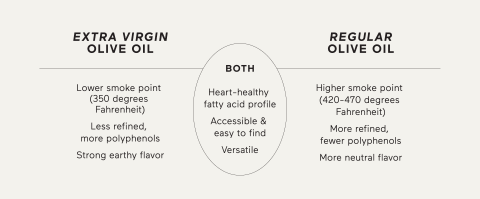
EVOO vs. olive oil: When to use each.
Want to maximize each of these oils in your kitchen? Here's when to opt for one over the other:
Cooking: Either
If you're cooking at moderate temperatures (350 degrees Fahrenheit or lower), either type of olive oil will be suitable—though EVOO will pack more health benefits.
You can choose one over the other based on whether you want a pop of olive oil flavor to shine through (in which case, opt for EVOO) or not (in which case, opt for regular).
If you're cooking at temps any higher than 350 degrees, go for pure olive oil (or avocado oil), which can withstand more heat without burning.
Baking: Pure olive oil
Since pure olive oil has a milder flavor, it's Caspero's go-to for baking. You can also opt for light olive oil here, too, if you really want to hide any trace of olive taste.
Dressings, sauces, and marinades: Either
Both EVOO and pure olive oil work well in dressings and marinades, Nielsen says. If you want to taste the bright, fatty, slightly grassy notes (and reap the extra health benefits) of EVOO, go with that, Caspero says. But if you simply need an oil to balance things out, pure does the job too.
Hair and skin: EVOO
You already know that EVOO works wonders in your body—but what about on your body? Well, depending on your hair and skin type, you might just want to keep a bottle in your bathroom in addition to your kitchen.
It's best used on dry, kinky, curly hair (read more about how to manage your mane with this oil here) and on skin as a makeup remover, cleansing oil, occlusive moisturizer, and more. Here are more details on the many ways EVOO's healthy fats and antioxidants do your skin good.
Shopping tips.
No surprise here: The benefits you reap from a bottle of olive oil will depend on its quality.
When shopping for olive oil, you'll want to be conscious of olive oil fraud (it's a real thing, folks!). Investigations show that some companies label pure olive oil as "extra-virgin" to increase the price, while others cut their olive oil with soybean or sunflower oil in order to cut costs.
To ensure you're getting what you pay for, check the oil's label for details like the harvest date, types of olives used to produce the oil, and the exact harvest location, suggests Nielsen.
You'll also want to pay attention to its packaging. "Extra-virgin olive oil should be packaged in dark glass to help protect it from light," says Nielsen. Light causes the oil to oxidate, essentially stripping away some of its antioxidant benefits.
Choosing glass instead of plastic packaging is important. Plastic is lipophilic—in other words, it loves fat—and therefore the oil could potentially contain plastic chemicals13.
Another detail to confirm: Make sure there's no sediment at the bottom of the bottle, which also indicates your oil will oxidize more quickly. Once you've purchased an oil, follow these storage tips to preserve its benefits for as long as possible.
RELATED READ: The 10 Best Olive Oils Of 2023
Shop mbg-approved olive oils
Frequently Asked Questions
Which olive oil is best to use for cooking?
Since pure olive oil has a higher smoke point, use it for any cooking done at higher than 350 degrees. Otherwise, extra-virgin olive oil is the healthier pick (though it does have a stronger flavor).
Is it OK to have extra-virgin olive oil every day?
100%. In fact, it's Caspero's oil of choice—and one she recommends to clients all the time. EVOO is rich in antioxidants and has been shown to help ward off heart disease, Type 2 diabetes, and cognitive decline.
Is extra-virgin olive oil OK for frying?
Since regular olive oil has a higher smoke point, it's your better bet for frying. EVOO is also expensive, so using a lot of it for frying is a bit of a waste of its nutritional value.
The takeaway.
When it comes to olive oils, EVOO is the star child—and it's certainly earned that reputation. Loaded with antioxidant polyphenols, healthy fats, and more, it has plenty of health benefits (and lots of flavor) to offer. That said, while pure olive oil doesn't boast quite the same level of antioxidants as EVOO, it's still one of the healthiest cooking oils out there—and a much better pick than highly refined seed oils.

Lauren Del Turco, CPT is a freelance health and wellness writer, editor, and content strategist who covers everything from nutrition to mental health to spirituality. Del Turco is also an ACE-certified personal trainer. She graduated from The College of New Jersey with a Bachelor of Arts in English and Creative Writing. When she’s not on deadline, you’ll find Del Turco hiking with her dogs, experimenting with new plant-based recipes, or curled up with a book and tea.
13 Sources
- https://www.mdpi.com/2072-6643/10/5/570
- https://pubmed.ncbi.nlm.nih.gov/31752333/
- https://pubmed.ncbi.nlm.nih.gov/34372670/
- https://pubmed.ncbi.nlm.nih.gov/26365989/
- https://www.ncbi.nlm.nih.gov/pmc/articles/PMC5436092/
- https://www.ncbi.nlm.nih.gov/pmc/articles/PMC6872540/
- https://pubmed.ncbi.nlm.nih.gov/34895363/
- https://pubmed.ncbi.nlm.nih.gov/33023123/
- https://pubmed.ncbi.nlm.nih.gov/17935291/
- https://academic.oup.com/ajcn/article/101/1/44/4564320
- https://pubmed.ncbi.nlm.nih.gov/20678538/
- https://www.ncbi.nlm.nih.gov/pmc/articles/PMC4306719/
- https://pubs.acs.org/doi/10.1021/acs.est.1c01103
